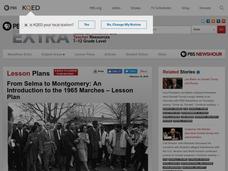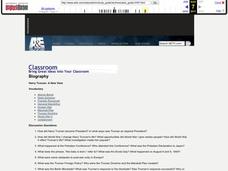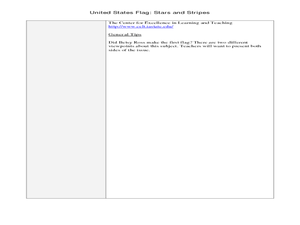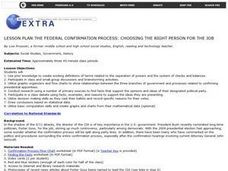C-SPAN
Judicial Review and Marbury v Madison
The Supreme Court case Marbury v. Madison may not be widely recognized but the landmark case is particularly significant because it established the precedent for judicial review and that the Supreme Court had power as an interpreter of...
Curated OER
The United States and the World
Journey through highlights of the late 19th and early 20th century with your history class. Topics covered are the highlights of Theodore Roosevelt's presidency, the Spanish American War, the building of the Panama Canal, and World War...
PBS
From Selma to Montgomery: An Introduction to the 1965 Marches
The 1965 Civil Rights marches from Selma to Montgomery and the resulting Voting Rights Act of 1965 are the focus of a social studies lesson. The resource uses film clips to inform viewers not only about the discrimination that gave rise...
Curated OER
Words from the Wise
Students explore how famous people, through newspaper Op-Ed articles, often inform the public about issues of national importance. They write Op-Eds in the voice of famous people on current news topics.
Curated OER
Harry Truman: A New View
Learners explore how Harry Truman became President and in what ways was Truman an atypical President. They examined World War I changed Truman's life and what opportunities World War I gave certain people and how World War II affected...
Curated OER
Research
This research PowerPoint provides questions to consider when selecting a research topic. Emerging writers consider their purpose for writing and the audience they are writing for, and then practice narrowing down a topic given a list of...
Curated OER
Should Kids Vote?
Students develop critical analysis skills important to evaluate democratic structures. They increase their knowledge of the characteristics of voters and voting impact on the Electoral System.
Illustrative Mathematics
Voting for Three, Variation 2
Here is another opportunity for math students to apply reasoning to solve real-world problems with ratios. The ratio of the number of votes for two candidates is provided. Your class is asked to use this ratio and information given about...
Curated OER
Jackie Steals Home
Students read articles relating to Jackie Robinson's breaking of the racial barrier in professional baseball. This leads to a deeper exploration of racism in the United States. They use a variety of worksheets imbedded in this plan to...
Curated OER
Social Studies: Campaign Finance Reform
Students develop arguments for and against campaign finance reform, examine federal and state laws that attempt to limit contributions to political candidates, evaluate various plans for campaign finance reform and formulate their own...
Curated OER
The Great Gatsby: Primary Sources from the Roaring Twenties
Students research the Roaring Twenties. In this 1920's America lesson, students analyze primary sources to develop an understanding of lifestyles and values of the era as they read F. Scott Fitzgerald's The Great Gatsby.
Curated OER
The Mayor Speaks to the Class About City Government
Students investigate politics by speaking to the Mayor of their city. In this local politician lesson, students listen as the Mayor speaks in front of them in their class and ask the Mayor questions about his daily duties. Students write...
Illustrative Mathematics
Voting for Three, Variation 3
Get your learners to think outside the box. Learners require a good understanding of ratios and their relationship to fractions to complete the problem. The only quantities given in the problem are the ratio of the number of votes for...
Curated OER
Voting Simulation
Students explore the process of voting. They study the lawmaking branch of the state government.
Illustrative Mathematics
Voting for Two, Variation 1
The votes are in and your mathematicians are going to calculate how many votes each candidate received. Three different solution choices are given, depending on which method is taught. Have your learners set up a table, compute parts, or...
Curated OER
Polling and Statistics
Young scholars investigate polling. In this statistics lesson, students collect data-on polling and graph their data on a coordinate plane. They identify biased and non-biased polling.
Curated OER
United States Flag: Stars and Stripes
Learners study the symbols and history of the United States flag. In this United States flag lesson, students complete a KWL about the U.S. flag. Learners then visit a website to learn about the American flag and discuss the topic....
Curated OER
THE FEDERAL CONFIRMATION PROCESS: CHOOSING THE RIGHT PERSON FOR THE JOB
Students analyze the process whereby presidential appointees are confirmed.
Curated OER
Get Out the Vote!
Young scholars discuss importance of voting within a democracy, and investigate reasons why people vote, and why they don't. Students then conduct survey, make hypotheses about voter motivation, and develop materials to promote voting...
Curated OER
The Constitution: the Head of State
Students participate in a constitutional convention to debate whether Australia should become a republic. They form small groups to represent various sides of the debate such as parliamentary republicanism, popular republicanism and...
Curated OER
God's Creation
Second graders explore religion by analyzing the state of the country. In this American creation lesson, 2nd graders read that God created the world and therefore the United States and all of the beautiful things within the country....
Curated OER
Stage a Debate: A Primer for Teachers (Lincoln-Douglas Debate Format)
For a comprehensive overview of debate styles and formats, look at this resource. It details the Lincoln-Douglas debate format (one-to-one debate with specific, timed rounds of points, cross-examination, and rebuttals). You can also find...
Curated OER
Dictating the Future
Read the article "Bush Lays Out Goals for Iraq: Self-Rule and Stability" and examine the keys points from President Bush's speech. Whether presented in written text or as an audio bite learners will work in groups to research world...
Close Up Foundation
Teach the Vote
Why is voting important? A social studies unit presents a non-partisan approach to the importance of voting, to voting laws and procedures, and to resources that voters need to become informed voters.
Other popular searches
- Classroom Elections Speeches
- Classroom Elections Platform
- Classroom Elections Speecher
- Classroom Elections Speech Er

























